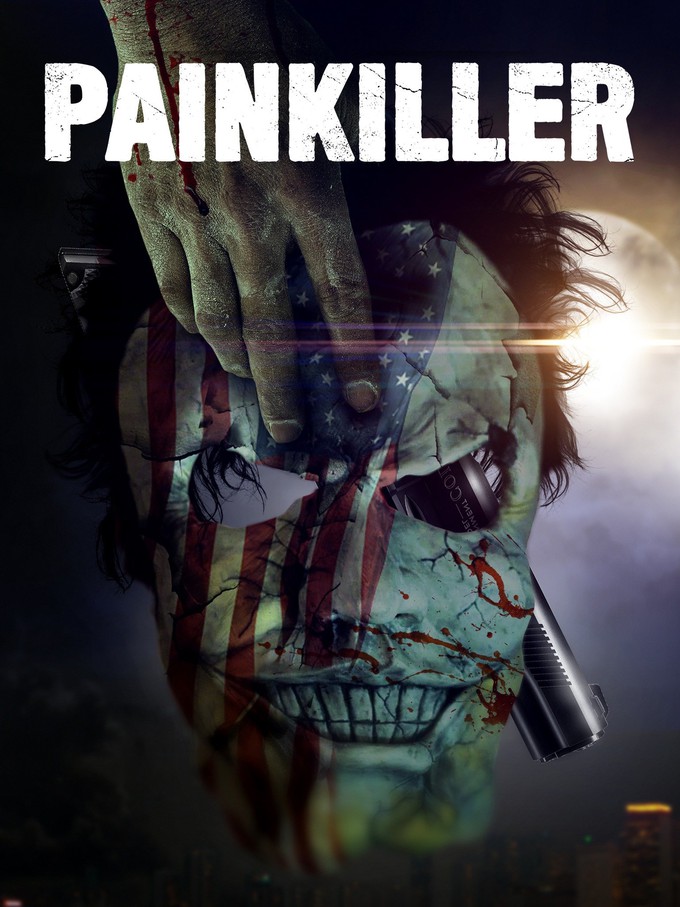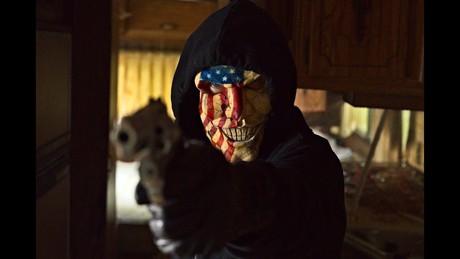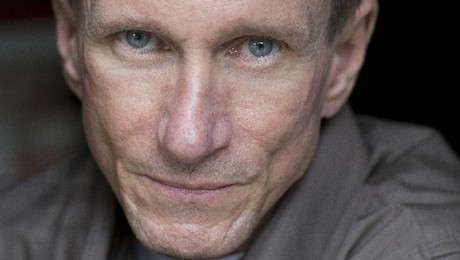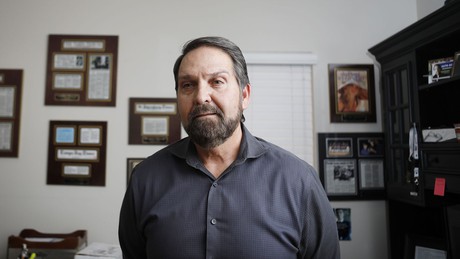
Hey guys, Prometheus here! Recently I reviewed the new film by Mark Savage, PAIN KILLER. Bill Oberst Jr. and Michael Paré both give great performances, and the story shines a light on an all too well-known fact: Big Pharma cares about profits more than it cares about people.
This story comes from a personal place for writer Tom Parnell, having lost his son, Jordan, to the opioid crisis. Although he tells me it was a cathartic experience, there is no way in hell that was an easy thing to do. No way.
PAIN KILLER is not based on the actual events that happened to Tom’s family, rather, the film tells a fictional story about a man named Bill (played by Bill Oberst Jr) who lost his child to opiate addiction. He runs a hotline of sorts for others who have lost loved ones to similar situations.
Then, Bill does something that anyone who has ever lost someone to their addiction to pain meds has only dreamed of doing. He starts getting even.
I won’t spoil the entire movie here, but if you haven’t watched it yet, put it on your list. I reached out to Bill Oberst Jr, along with writer Tom Parnell to discuss making the film, and the inspiration and downright pain that went into it.
Bill Oberst Jr - BOJ
Tom Parnell - TP
Joshua Scafidi - JS
JS: So, PAIN KILLER! I saw it and really liked it. I love the fact, and I don’t mean to say it like this but, Tom, I love the fact that you had the balls to say something millions have been wanting to say. It hit home for me. I lost my brother to the opiate crisis, so the film struck a nerve. Tom, I understand the story stems from a personal tragedy that you went through? Is that something you’re comfortable talking about here?
TP: You know it’s kind of funny because a lot of people have asked me that, and it’s been kind of cathartic. I’ve talked about it now, so many times. I don’t mind at all. When I came up with this idea, it was an effort to leave a legacy for Jordan, of some sort. Because I couldn’t figure out what to do, for a couple of years. I was going to a grief counselor, and I still go, and she suggested I do something to preserve a legacy for him and I didn’t want to start a foundation or another charity and ask for money. There are so many of those. So, I kind of let it go. Then all of a sudden it just hit me a couple of years later, like this is something we can do, and that’s why I wrote the script.
JS: So, would you say it was therapeutic, writing the script out?
TP: Yes, I would. Because he passed on December 23, 2017. It was the worst day of my life. Thank God that I didn’t have to see his body. My ex-wife and daughter did. My daughter even tried to revive him. We’re working hard to get through this because they were so close. I’ve said a lot of things, and I’ve thought a lot of things. You think about what if’s, what could I have done. When I wrote the lines for Bill when he says; I’m not totally blameless in this. Why didn’t I see her pain? Lines like that were things that I felt inside about my own situation. I was able to get that out, and of course, Bill delivered it beautifully. It actually makes me feel better when I watch the movie because I still feel that way sometimes. I’m not trying to play the what-if game, but there are days where I just can’t help it. Yes, I think overall, writing and then filming it, and watching it has all been therapeutic for me.
JS: It’s such a tough thing. It was tough when I lost my brother. I can’t imagine losing a child. My condolences, Tom. I really respect that you put it into an art form and got the message out there. There’s a lot of people suffering through similar situations that can watch this and relate. Then maybe they can speak up. You mentioned Bill’s performance. Bill, you give one hell of a performance in this film, man.
BOJ: I hear you say that, and I thank you…
TP: (Laughing.)
BOJ: I’m not convinced that I did. Some of the stuff that I do, some of the horror stuff where you’re killing people and the lines are pretty rudimentary - okay, you do your best, and you’re pretty confident you can do it. But this, because I know Tom and because he’s a friend, and Mark (Savage, the director) is my friend, I felt this really heavy, emotional responsibility to portray it in a very real way. I’m still not sure that I did, but I’m glad that you liked it.
JS: I thought the performance felt very genuine, and I don’t just hand out compliments. You earned it. Where did you get the inspiration for the role? How did you prepare?

BOJ: Well, for me, the core of this character is - because it’s a revenge fantasy, he’s doing what we all would like to do. He’s trying to make sense of the senseless and he’s lashing out because that’s what you feel like doing when something this big has happened, and the world kind of tells you to just move on. So, for me, the way that I could connect with that was to connect with my vengeful self. Because I like to pretend that I’m not, but my first instinct, if you cut me off in traffic, is always; hey, maybe your car will explode into flames. Oh, well. Maybe you should have been more careful.
That’s always my first thought, and then I say; oh, God please forgive me. I’m so sorry. But my first thought is always vengeance. It wasn’t hard for me to connect with vengeance. I haven’t suffered this kind of loss, but the feeling of lashing out at people, whether they were directly involved or not, because people like that need to pay - I’m very familiar with that.
JS: Now it was directed by Mark Savage, who you’ve worked with before.
BOJ: Oh yeah, Mark is one of my directorial deities. I think he’s great because he’s willing to just bluntly say things that other people would be uncomfortable saying, cinematically. There’s a reason that some of his early stuff was banned in Australia.
JS: Tom, what was your experience like working with Mark?
TP: Well, we’re business partners so we talk almost every single day. When I told him the script I had, he flew to Tampa a few days later and stayed at my house for about a week, and we roughed out the entire script. He really believed in it. We have a procedure because we write everything together, we have a certain way that we handle things. We’ll come up with a concept, whether it’s mine or his, he’ll rough out a treatment and give it to me to go ahead and rough out the first draft. Then we get on Skype and relentlessly rewrite. It drives me crazy, like studying for a test you have to take thirty times. By the end, we come out with a polished gem. At least, I hope so.
I rewrote half of Pain Killer while we were filming. Bill is so easy to work with that I would go to him and say; what do you think about this line? We’d talk about it and I might change it, and come up with something he liked, or vice versa. He’s so easy to work with and delivers it flawlessly.
BOJ: Tom, Josh is a screenwriter himself so, he’ll understand this. The words that a writer writes, the writer puts them there for a reason. I don’t want to just change them willy-nilly, so this was pretty damn awesome to have Tom there on set to discuss things with. Because I knew that every word really mattered to him. I really appreciated him being there because I’m never comfortable just asking to change what the writer said. This was a great collaboration.
JS: I totally understand. When you write a character’s words, it’s almost a portrayal of their persona. So, changing that might change your view of the character.
TP: Josh, let me tell you a quick funny one. That’s true. Everything Bill said was true. He’ll say the lines, no matter what, but there was an exception to that. In Stressed to Kill there’s one scene where they’re in a café. My daughter was in that movie. Pretty blonde, over at the table next to Bill. She’s talking loudly and it’s pissing him off. She’s getting dumped by her boyfriend. So, he reads the lines, and he comes over and asks; do you really want me to say this? I said, yeah! He goes, but it’s your daughter. He was more worried about my daughter than he was the lines!
BOJ: I remember that…
TP: So, my daughter says, What? You’re dumping me? Bill leans over and says, yeah, he’s dumping you… you plastic bitch. Hopefully into a landfill.
(All Laughing.)
BOJ: Did we show that, Tom? Was that in the movie? It was his daughter, Josh!
TP: It was a great line!
BOJ: I have a lot of latent anger, so it’s a good partnership between Tom, Mark, and I. Like, some of these guys are really comfortable with it. Tom does it for a living, pretty much. I’m the one who subverts it and is all gentle, but I have a lot of latent anger underneath.
JS: So, with all that latent anger, Bill - what was it like running around (in the film), getting revenge on people?
BOJ: Great… Can’t lie.
TP + JS: (Laughing.)

BOJ: Great fantasy. I loved it in Stressed to Kill, too. Even though the subject matter is a little harsh. When you get to come up to somebody who you know has been responsible, even on the executive level, for the knowing, willful, and negligent death of thousands of people - and you get to say; are you the CEO? Yeah, I am. Who are you? - Your conscience. Then, bam, bam, bam, bam! There’s no human being that would not enjoy that, in those seconds. Right after those few seconds, maybe you go, oh, what have I done? But in those few seconds, it’s damn enjoyable. That’s why people like revenge movies.
JS: Everyone’s wanted to get revenge.
BOJ: Speaking of the killer character, half of that was me and half of it was Tom. Tom did the stunts. Tom, I meant to ask you, why did you come up with the idea of having the character use a six-shooter, rather than a more modern type of weapon?
TP: Well, we gave him distinction with the mask. That turned out to be terribly popular. I wanted him to have something unique and Mark came up with the idea of calling him the Six Shooter? So, he had to have a gun that only has six shells in it. Glocks, Rutgers, those things hold fifteen to twenty rounds. That’s why we used the .357 revolver. It was actually my gun.
JS: I just kind of assumed it was because revolvers don’t leave shells behind…
TP: That’s brilliant! I’m going to use that! Yes, that’s right, Josh… that’s what I was thinking!
JS: The scenes between Bill and Michael Paré were great.
BOJ: Paré was great, they really picked a winner. He h=as real charisma, and when you’re in a scene with him, you really want to bring it because he’s very strong.

TP: When Paré and I had that fight, in the trailer, when I told him to get out of my house - we shot that like four, or five times. He asked me how rough I wanted to get with this thing, and I said just bring it… and he did. The next day I had a line of bruises under my neck and all across the top of my chest where he had grabbed me and shoved me into the pantry and started choking me. He really brought it.
JS: Thanks for your time, guys. I appreciate it.
TP: Thank you so much.
BO: I appreciate you, thank you.
Be sure to check out PAIN KILLER, available now on DVD, and VOD from Cinedigm!
